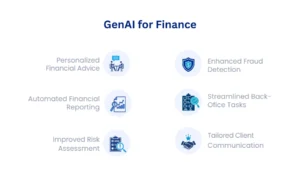The finance sector is undergoing a digital revolution — and Generative AI for financial services is leading the charge. As it can create smart systems that think, learn, and act like humans, the technology is transforming how banks, insurers, and investment firms conduct business.
According to recent studies, the Generative AI for financial services is anticipated to grow at a rate of 28.1% from 2022 to 2032 and reach an estimated value of $9.48 billion during the forecast period. The rapid growth illustrates how the financial industry relies very much on automation, predictive analysis, and data-driven decisions.
From automating compliance to personalizing financial recommendations, Generative AI consultancy is enabling financial institutions to make smarter, faster, and more secure business decisions. In this blog, we’ll explore how Generative AI for financial services is reshaping the future of finance — its key applications, challenges, and the strategic role of expert AI consulting in driving sustainable innovation.
Understanding Generative AI for Financial Services: The Future of Intelligent Finance
Generative AI for financial services revolutionizes the operations of finance by tapping into the power of machine learning, deep learning, and large language models (LLMs). Unlike traditional AI, which focuses on pre-determined rule-based systems, the financial services’ Generative AI creates new knowledge, makes decisions, and simulates actual market conditions with unmatched precision.
This technology allows banks, insurance, and investment houses to speed up processes, reduce manual intervention, and make more informed, data-driven decisions. From portfolio management and fraud detection automation to enhanced financial forecasting and reporting, Generative AI consultancy helps financial institutions achieve higher efficiency, accuracy, and scalability.
With the finance sector increasingly embracing digital innovation, the application of Generative AI for financial services is part of competitiveness, regulation, and innovation.
Core Values of Generative AI in Financial Services
The strength of AI in banking and finance lies in its ability to combine automation with intelligent capabilities. Some of the main ingredients that render Generative AI products so revolutionary for banks and financial institutions are outlined below:
1. Natural Language Processing (NLP)
NLP enables systems to read, abstract, and generate complex financial content — from reports to customer communication. It facilitates faster data interpretation and clearer communication in the financial process.
2. Deep Learning Models
Deep learning models identify complex patterns in data, improving risk assessment, detecting fraud, and strategic forecasting. Their ability for ongoing learning helps institutions stay adaptive and forward-looking in fast-changing markets.
3. Synthetic Data Generation
This approach offers real-world financial simulations to validate investment models and stress-test risk situations. It supports better decision-making by allowing institutions to model diverse market conditions securely and effectively.
4. Conversational AI
Thanks to intelligent chatbots and AI-powered advisors, conversational AI is reshaping banks’ customer engagement. It provides personalized financial advice, streamlines portfolio management, and facilitates seamless, human-like interaction across digital channels.
The Reason Why Generative AI for Financial Services is a Game-Changer
The increasing relevance of Generative AI in the financial services industry is that it is capable of integrating intelligence, automation, and innovativeness in all parts of the financial ecosystem. Regulatory compliance, risk assessment, customer engagement, and many more. Generative AI is enabling financial institutions to make faster, smarter, and more informed decisions.
The following are the most influential means through which Generative AI consultancy is reshaping the financial industry.
Making Regulatory Compliance with Generative AI Consultancy Simple
Financial regulatory environments are dynamic. Generative AI consultancy helps companies process large volumes of regulatory data and infer intricate code modifications with accuracy. With regulation analysis automation, financial institutions would remain compliant, decrease risks, and respond to changes in policies in an efficient manner, without wasting time on manual auditing and compliance tracking.
Individualized and Analytical Financial Planning
Generative AI for financial services helps institutions provide individual financial advice with extensive data analysis and complex algorithms. This personalization enhances customer satisfaction as it enables people and companies to make better choices on investments, savings, and financial planning, and there is an improved financial result for each client.
Speeding up Document Processing and Synthesis
Generative AI solutions enable the search and synthesis of financial documents to be automated, with the capability of handling large datasets in a short period. Financial analysts can spend less time manually extracting insights from reports, contracts, and statements by automatically extracting information, which means that they can spend more time on strategic analysis and make better decisions faster.
Automating Financial Operations and Accounting
Generative AI for financial services in accounting assists in the automation of repetitive activities in accounting, including reconciliation, data entry, and categorization of transactions. This not only minimizes the error of man but also guarantees high accuracy in financial records. By AI managing the manual workloads, the finance teams will be able to concentrate on core business strategies and value creation.
Change Financial Reporting and Analytics
Generative AI for financial services can be used to produce real-time financial reports with great detail by combining data of multiple types. Such automation improves accuracy, increases transparency, and reports are always consistent with the expectations of the stakeholders and regulations.
Enhancing Data Protection and Fraud Deliberation
Generative AI also has an application in finance in fraud prevention and data protection. AI models can be used to identify fraud before it takes place by identifying suspicious patterns or anomalies in transaction data. Generative AI for financial services also protects confidential financial data by using sophisticated encryption and permission tracking to ensure integrity and trust.
Improving Portfolio and Risk Management
Generative AI for financial services can be used to optimize a portfolio more intelligently and manage risk through analysis of past information, market volatility, and customer characteristics. This implies that financial institutions are able to make informed investment choices and reduce their exposure to risks, something that is very important in the current markets that are very unpredictable.
Harnessing the power of smarter algorithmic trading
Using real-time data analysis, Generative AI algorithms can locate lucrative trading opportunities and trade them accurately. The implementation of AI in banking and trading will lead to a more efficient market and will guarantee that traders have the possibility to respond in real-time to market changes with streamlined algorithmic approaches.
Maximization of Tax Planning and Compliance
Generative AI solutions can simplify tax compliance processes by automating tax data analysis and interpretation of tax laws. Financial institutions and businesses are able to streamline their tax planning, minimize tax obligations, and guarantee that local and international tax requirements are fully met without too much manual work.
Sentiment to Customers: How to Understand the Customer Better
In the case of AI consultation in the financial sector, it enables organizations to study the feedback of their customers through various means, such as surveys and social media. With the use of generative AI for financial services, it is possible to gauge the mood of the population toward their product and service, and based on this data, banks and financial organizations can personalize their offers, increase their satisfaction, and build their client base.
Enhancing Lending Decisions and Credit Risk Assessment
One of the most common role of GenAI in finance is credit risk assessment. Through credit histories, economic indicators, and spending patterns, AI models assist lenders in making correct, data-supported lending choices. This reduces default risks, and a fairer credit assessment is done on varied borrower profiles.
Developing Smart Chatbots and Virtual Financial Assistants
Generative AI for financial services has transformed the customer experience by using AI-powered chatbots and virtual assistants. These smart applications offer real-time monetary care, account inquiries, and customized recommendations – enhancing the service accessibility and minimizing the response time.

Challenges of Implementing Generative AI in Financial Services
While Generative AI for financial services has immense promise, its implementation is not without its challenges. Financial institutions must deal with complex issues in data security, compliance, ethical practices, and systems integration to ensure that AI enhances—rather than erodes—essential core financial functions. Properly addressing these challenges allows organizations to achieve the full potential of AI in banking and finance.
1. Navigating Regulatory and Compliance Challenges
The financial sector operates under strict regulations to protect consumer interests and promote transparency. Generative AI for financial services poses explainability, accountability, and regulatory issues. AI systems must adhere to international standards such as GDPR, SEC guidelines, and financial reporting standards.
Among the obstacles is enabling explainable AI, whereby financial institutions—and regulators—can properly view how AI models conclude, whether for fraud detection or credit score. Non-compliance leaves institutions exposed to liability and reputational risk, emphasizing the need for specialized Generative AI consultancy to advise on regulatory compliance.
2. Safeguarding Data Privacy and Security
Since Generative AI solutions rely on a lot of financial information, robust data protection is paramount. Unauthorized access, data breaches, or model manipulation can lead to enormous financial and reputational losses. Financial institutions must invest in advanced encryption, access management, and continuous system monitoring to protect confidential data.
Even when working with synthetic data for financial modeling, accuracy and data integrity are always of top concern. Effective governance and secure data pipelines facilitate trust and compliance throughout the operations of AI consulting for the finance industry.
3. Creating Trust with Explainable and Transparent AI
The “black-box” nature of AI is apt to limit visibility into the creation of predictions. Financial professionals need to trust—especially when they’re relying on AI for credit approval, investment forecasts, or anti-fraud control.
Developing transparent and explainable AI systems is the key to establishing confidence among decision-makers. By consulting with a Generative AI consultancy, financial institutions can build understandable AI systems that maximize transparency and performance accuracy without compromising trust.
4. Integrating AI into Legacy Financial Systems
Most financial institutions rely on legacy systems that are not sufficiently flexible to support AI automation. Integrating Generative AI for financial services, risk management systems, and compliance platforms normally involves extensive technical expertise and investment.
Partnering with an experienced AI development company helps to bring aging systems into the digital age, allowing them to integrate easily and automate scalably. Without integration, even newer Generative AI offerings can drive inefficiency instead of productivity improvement.
5. Overcoming Ethical Challenges and AI Bias
Ethical deployment is the cornerstone of AI in financial services. Ill-trained models tend to inadvertently promote bias—most notably in lending, credit scoring, and customer profiling. Financial institutions must remain actively monitoring and refining AI models to promote fairness, inclusivity, and transparency in automated decision-making.
Through adopting ethical AI frameworks and implementing regular audits, institutions can be confident that Generative AI for financial services promotes equitable financial outcomes for all customers.
Conclusion
The emergence of Generative AI for financial services is a significant trend of intelligent automation and a data-driven approach. This technology is changing all aspects of financial operations to the point of improving portfolios to enhancing the detection of fraud. However, the real potential of Generative AI for financial services is its effectiveness – balancing between innovation and transparency, compliance, and ethical responsibility.
With the help of an established Generative AI consultancy, financial institutions will be able to circumvent such obstacles as data confidentiality, compliance complexity, and integration of systems. The outcome is a more intelligent, nimble financial ecosystem in which decisions are made more quickly, risks are reduced, and customer experiences are improved.
At AnavClouds Analytics.ai, we are assisting financial firms to embrace the strength of Generative AI in financial services by providing customized consulting, highly implementable, and scalable AI services, which promote quantifiable growth.
FAQs
What does Generative AI mean in financial services?
Generative AI in financial services is the application of more sophisticated AI, which is capable of generating, processing, and modeling financial data. It assists the banks and other financial institutions in automating complicated business activities such as fraud detection, financial prediction, and regulatory compliance.
What are the opportunities for applying Generative AI in the finance industry?
Generative AI helps financial organizations to be more accurate, less manual, and make more rapid data-driven decisions. It improves financial reporting, customer service, and risk control and makes sure that compliance and security are achieved.
What are the most important issues of applying Generative AI in finance?
The key issues involve the threat to data privacy, compliance with regulations, ethics, and the challenges of integration with old systems. These problems can be overcome by collaborating with a mature Generative AI consultancy.
Why is financial cooperation with a Generative AI consultancy necessary?
A Generative AI consultancy offers professional advice in the design and implementation of AI-driven strategies. It makes sure that it complies, increases the level of data security, and assists institutions in unlocking the financial services full potential of Generative AI.



